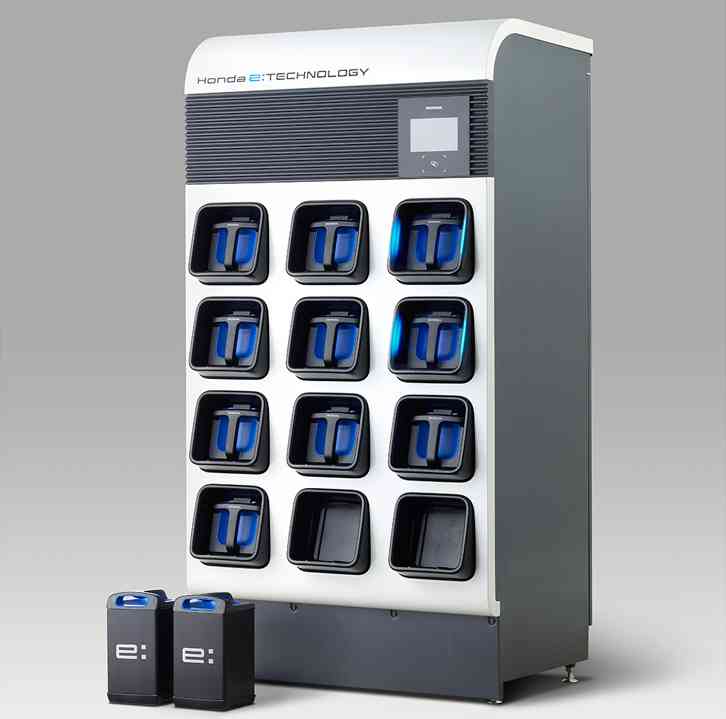
from Honda
Honda Begins Sales of “Honda Power Pack Exchanger e:” Battery Swapping Station
– Gachaco, a battery sharing business venture, begins operation of the first unit of Honda Power Pack Exchanger e: in Japan –
TOKYO, Japan, October 25, 2022 – Honda Motor Co., Ltd. today announced that it has begun sales of the Honda Power Pack Exchanger e: battery swapping station in Japan, with the first unit delivered to Gachaco Inc., a battery sharing service joint venture. Gachaco today began operation of the first mass-production model of the Honda Power Pack Exchanger e: in Japan.
Honda Power Pack Exchanger e:
Product website: https://www.honda.co.jp/mobilepowerpack/exchanger (Japanese)
Honda is striving to realize carbon neutrality for all products and corporate activities Honda is involved in by 2050. Electrification of mobility products, which is indispensable to achieve this goal, has three challenges that need to be addressed: short range, long charging time and high battery cost. By addressing such challenges with swappable batteries and their sharing service, Honda is striving to contribute to the acceleration of electrification and expansion of the use of renewable energy.
Honda Power Pack Exchanger e: is a battery swapping station that simultaneously charges multiple units of Honda Mobile Power Pack e: (MPP e:) and enables smooth battery swapping for users of electric motorcycles and other mobile products equipped with MPP e:. The users will have access to fully-charged MPP e: whenever needed at battery swapping stations in the city, which enables efficient use of electrified mobility products without waiting for the batteries to get charged.
Developed as a battery infrastructure which can achieve widespread use inside and outside of Japan, Honda Power Pack Exchanger e: features an exterior design that blends in well with the cityscape and adopts the Honda Power Pack Cloud system that centrally manages all information necessary for a battery sharing service operation in the cloud. Moreover, Honda pursued the convenience and user-friendliness for both battery sharing service businesses and the users of electrified mobility products.
In India, through its local subsidiary, Honda Power Pack Energy India Pvt. Ltd. (HEID), Honda has already started a battery sharing service for electric tricycle taxis (“rickshaws”), using Honda Power Pack Exchanger e:.
By offering the products and operating system for customers who are interested in battery sharing, Honda will continue supporting electrification of their mobility products and contributing to the realization of a low-carbon society.
For more information about the joint battery sharing service of Tokyo Metropolitan Government and Gachaco Inc., please visit the website of Tokyo Metropolitan Government.
https://www.metro.tokyo.lg.jp/tosei/hodohappyo/press/2022/10/12/05.html (Japanese)
For more details about this battery sharing service, please contact Gachaco Ins.
https://gachaco.co.jp/contact (Japanese)
Go Old School on them at Bandit’s Cantina or read his entire futuristic novel “Sam Chopper Orwell” predicting your gas station situation. Click to get your “Ticket” LOL.
Key features of Honda Power Pack Exchanger e:
Simple and smooth battery swapping:
Both the higher and lower slots are designed to have an angle that makes it easy to insert or remove the battery.
The Exchanger automatically begins charging when the battery is put in the slot.
To swap batteries, the user taps the panel on the upper part of the Exchanger with their IC card (integrated circuit card or smart card) for user authentication, ensuring a high level of security.
Based on the user’s mobility product information (such as the number of batteries, and other conditions such as a series or parallel connection of batteries) associated with the preregistered user ID, the Exchanger determines and lets the user know which fully-charged batteries are appropriate for the user via LED display, which enables smooth swapping.
Ease of use, ease of maintenance and ease of management:
All information necessary for the operation of the battery sharing service, such as the charge status of each of battery at the station, information on battery availability and the operational status of the station, is consolidated and managed centrally by the Honda Power Pack Cloud system.
The users can complete the entire process, from user registration to finding stations, swapping the batteries and making payments, through the same system. In addition, using a smartphone, the users can search real-time information about batteries available for renting, which contributes to smooth battery swapping.
The battery sharing businesses can manage and operate their service efficiently by managing the status of their stations and batteries centrally in the cloud.
The Honda Power Pack Exchanger e: features a structure that makes it possible to perform routine maintenance and cleaning tasks with easy access from the front.
The Honda Power Pack Exchanger e: is equipped with a battery cooling function to suppress the heat-induced degradation of batteries.
Multiple units can be connected and installed as one station:
To increase the number of batteries the station can manage and operate simultaneously, multiple units of Honda Power Pack Exchanger e: (“extension unit”) can be connected per one main unit (“control unit”) of the Honda Power Pack Exchanger e:, offering flexibility to accommodate the needs of the users and operators of the battery swapping station.
Enabling battery swapping even during a power outage:
In case the power supply to the Honda Power Pack Exchanger e: is interrupted due to a power outage or any other reason, the Honda Power Pack Exchanger e: will continue renting batteries to users while drawing power from the pre-charged MPP e: in one of the slots.
Design that blends in with the cityscape:
Anticipating installation in various locations throughout the city, Honda Power Pack Exchanger e: was designed with the main concept of “blending into public spaces,” realizing an unimposing cabinet design that looks like one unit even when multiple units are connected.
